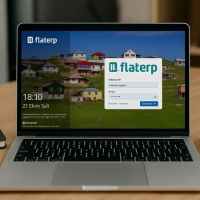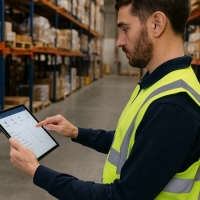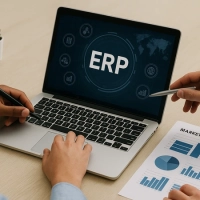
- 1. Consolidation of Financial Data on a Single Platform
- 2. Real-Time Financial Reporting
- 3. Reduction in Error Rate
- 4. Facilitating Tax and Legislative Compliance
- 5. Better Cash Flow Management
- 6. Reduction of Operating Costs
- 7. Use of Financial Data in Strategic Decision Making
- Key Advantages of Accounting Integration with Flaterp
- Conclusion: Accounting Integration is No Longer a Luxury, It's a Must
1. Consolidation of Financial Data on a Single Platform
Traditional accounting software often operates independently. Invoices from sales are kept in a separate location, production costs are processed in another spreadsheet, and inventory transactions are processed in a completely different system. Ultimately, accounting spends significant time trying to integrate data from disparate sources.
Thanks to ERP integration, all financial data is collected on a single platform . Once a sales invoice is issued, it's automatically reflected in accounting, deducted from inventory, and entered into the cash flow statement.
By connecting all these processes end-to-end, Flaterp reduces the burden on the accounting department and ensures data deduplication. This makes financial consolidation effortless.
2. Real-Time Financial Reporting
In most businesses, accounting reports are prepared at the end of the month or quarter. This forces decision-makers to rely on historical data. However, in dynamic markets, instantaneous decisions are crucial.
Thanks to ERP integration, managers can instantly view critical reports such as income statements, balance sheets, and cash flows. This instantly reveals which product groups are more profitable, which customer segments are experiencing collection delays, or which departments are increasing costs.
Flaterp's advanced reporting tools provide managers with real-time decision-making power with visual dashboards and customizable tables.
3. Reduction in Error Rate
Manual data entry is the most common cause of accounting errors. A mistyped figure, a double-recorded invoice, or a forgotten inventory transaction can undermine the reliability of reports, distort financial statements, and even lead to tax penalties.
ERP and accounting integration minimizes these errors. When a sales invoice is issued in ERP, it is automatically processed in accounting. When an inventory movement occurs, the corresponding accounting record is automatically created.
Flaterp minimizes manual intervention by synchronizing invoice, inventory, order, and production processes with the accounting module. The result: fewer errors, more reliable reports.
4. Facilitating Tax and Legislative Compliance
One of the most challenging areas for businesses in Turkey is adapting to constantly changing tax legislation . Digital transformation applications such as e-invoices, e-ledgers, and e-archives are crucial for both speed and legal compliance.
With ERP integration, these processes are automated. Invoices are issued electronically, ledgers are stored digitally, and accounting processes are conducted in compliance with regulations.
Flaterp is fully compatible with e-transformation practices in Turkey. This allows businesses to gain speed while protecting themselves from penalties.
5. Better Cash Flow Management
For a business to grow, it's not enough to make a profit; it also needs to manage its cash flow effectively . If sales are made but collections are delayed, the business can find itself in financial difficulties.
ERP and accounting integration allows for real-time cash flow monitoring. The system clearly displays which customers' payments are overdue, which suppliers are due for payment, and the current cash balance.
Flaterp guides the finance team with cash flow statements and collection/payment reminders, preventing surprise cash shortfalls.
6. Reduction of Operating Costs
One of the most tangible benefits of ERP integration is reduced costs .
- Time is saved by eliminating manual work.
- Reducing errors reduces the cost of correction.
- Repetitive data entry is eliminated.
Flaterp offers businesses both direct and indirect cost advantages through accounting integration. Less wasted staff time means more work focused on creating value.
7. Use of Financial Data in Strategic Decision Making
The most critical contribution of ERP and accounting integration is that financial data does not remain merely a “record” but also becomes a strategic guide .
Thanks to ERP data:
- Investment decisions can be made.
- Product groups that will increase profitability can be determined.
- Budget controls can be made.
- Financial risks can be identified earlier.
With customizable reporting and analytics tools, Flaterp empowers businesses to not only see the past but also plan for the future.
Key Advantages of Accounting Integration with Flaterp
When you consider ERP and accounting integration, the advantages offered by Flaterp stand out:
- Localized Accounting Module: Full compliance with tax legislation in Turkey.
- E-Transformation Compatible: E-invoice, e-ledger, e-archive integration.
- Comprehensive Integration: Seamless connection with banks, marketplaces, e-commerce infrastructures.
- User-Friendly Reporting: Visual dashboards and instant reports.
- Secure Infrastructure: Advanced security features that protect your data.
Flaterp is a powerful ERP solution that connects not only accounting but all business processes.
Conclusion: Accounting Integration is No Longer a Luxury, It's a Must
For businesses to achieve sustainable growth, simply offering good products or services isn't enough; they also need to manage their financial processes effectively. ERP and accounting integration provides businesses with speed, accuracy, reliability, and strategic leverage.
Flaterp is a reliable partner in your business's digital transformation journey with its localized accounting module, user-friendly design, and powerful integration features.
For more detailed information, please visit our Accounting page.
























